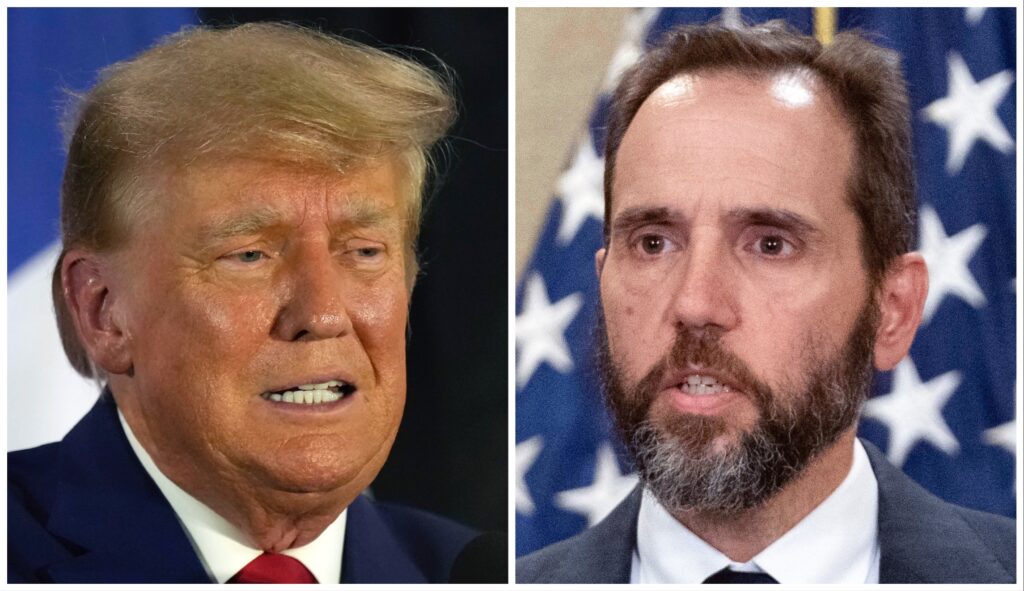A federal appeals court in Washington, D.C., ruled on Tuesday that former President Donald Trump cannot shake off his charges for an alleged effort to subvert the 2020 election by claiming presidential immunity.
Trump, who is facing four criminal indictments, has argued that presidents are immune from criminal prosecution for actions taken in office unless they are first impeached by the House and convicted by the Senate. The three-judge panel on the U.S. Court of Appeals for the District of Columbia Circuit found unanimously that Trump cannot invoke presidential immunity against the four-count indictment alleging he conspired to overturn the 2020 election.

“We cannot accept former President Trump’s claim that a President has unbounded authority to commit crimes. … Nor can we sanction his apparent contention that the Executive has carte blanche to violate the rights of individual citizens to vote and to have their votes count,” the appeals court panel said in the 57-page ruling Tuesday.
The decision is a notable blow against Trump, the presumptive Republican nominee for the 2024 election, who is accused on four criminal counts of attempting to subvert the 2020 election. While the judges were not asked to find Trump liable for the alleged crimes, they made clear the seriousness of his charges if he were convicted.
“Former President Trump’s alleged efforts to remain in power despite losing the 2020 election were, if proven, an unprecedented assault on the structure of our government,” the court said, adding Trump’s stances “would collapse our system of separated powers” by placing him outside the scope of the three branches of government.
“We cannot accept that the office of the Presidency places its former occupants above the law for all time thereafter,” the court said.
The District of Columbia Circuit told Trump he has until Monday to appeal the decision, including with a request to pause his trial proceedings. If he does, the criminal trial that is before U.S. District Judge Tanya Chutkan, the first to rule against his immunity claims, will not resume until after his appeal reaches a final resolution.
Trump’s legal team could appeal the ruling directly to the Supreme Court or first ask for en banc review at the appeals court — meaning the case would be heard again, but this time by the full circuit court.
The former president has said his actions following the 2020 election, including rallying supporters to protest the congressional certification of President Joe Biden’s victory, were efforts to “ensure election integrity” as part of his capacity as president. Trump’s lawyers also say that because Trump was acquitted by the Senate during his second impeachment proceedings, he should be protected by double jeopardy and protected from charges by the Justice Department for the same incidents.
Trump’s presidential campaign spokesman Steven Cheung argued in a statement following the decision that if immunity is not granted to Trump, “every future President who leaves office will be immediately indicted by the opposing party.”
“Without complete immunity, a President of the United States would not be able to properly function! Deranged Jack Smith’s prosecution of President Trump for his Presidential, official acts is unconstitutional under the doctrine of Presidential Immunity and the Separation of Powers. Prosecuting a President for official acts violates the Constitution and threatens the bedrock of our Republic,” Cheung said.
A hearing over the immunity dispute last month churned a wide-ranging discussion after Trump’s attorneys argued that presidents could essentially be protected from criminal conviction even for ordering a hit on political enemies — so long as that president is not impeached and convicted by Congress.
“You’re saying a president could sell pardons, could sell military secrets, could order SEAL Team 6 to assassinate a political rival,” Judge Florence Pan, an appointee of Biden, said during one exchange at the hearing last month, referring to the elite Navy unit. John Sauer, an attorney for Trump, said that impeachment by the House and conviction by the Senate would be required before a criminal prosecution.
James Pearce, a member of special counsel Jack Smith’s team, told the panel that accepting Sauer’s argument is “wrong for textual, structural, historical reasons, and a host of practical ones.”
“It would mean that if a former president engages in assassination, selling pardons, these kinds of things and then isn’t impeached and convicted, there is no accountability for that individual,” Pearce said.
Chutkan, who is presiding over the case brought by Smith, already ruled that Trump is not immune from prosecution. The ultimate outcome of the dispute over the presidential immunity argument could derail the eventual trial, which was initially slated for March 4 but is now delayed until the immunity question is fully settled.
Smith’s indictment accuses Trump of knowingly spreading lies that there was widespread fraud in the 2020 election and alleges his participation in a scheme to interfere in the peaceful transfer of power after his loss. Trump had pleaded not guilty to the charges.
Trump’s legal team has pointed to a 1982 Supreme Court decision involving former President Richard Nixon in which the justices ruled that presidents enjoy absolute immunity from civil lawsuits related to their official acts. But Smith’s team has suggested that Nixon’s acceptance of a pardon amid the Watergate scandal in 1974 reflected a “consensus view” that former presidents can face prosecution after leaving office.
CLICK HERE TO READ MORE FROM THE WASHINGTON EXAMINER
The special counsel previously sought to skip over the appeals process entirely, but the Supreme Court ruled in December that the matter must be weighed by the District of Columbia Circuit first before the issue can ascend to the highest court.
Now the high court will once again be thrust into a position of whether to take up the contentious dispute.
Read the ruling in full here:
Trump can't claim presidential immunity against 2020 election charges: Appeals court by Kaelan Deese on Scribd
